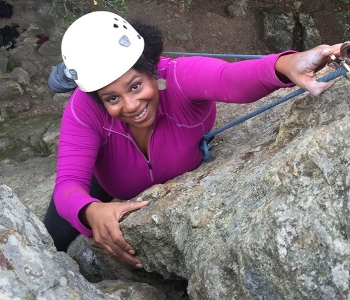How to Build Resilience

“Resiliency is being able to bounce back during stressful times, and there are lots of ways you can build resilience. It’s not a set character trait—it is more like learning an instrument. Some people pick it up, and it comes easily and naturally. For others, it takes more learning and practicing,” says Girl Scout alum Deborah Fernandez-Turner, an Arizona-based psychiatrist and medical director for health insurer Aetna.
Here’s her advice for how to build resilience as a foundation for the strength and endurance you need to face your stress and challenges head-on.
1. Build a routine.
“Your personal building of resilience is about routines that make sure you get enough sleep, that you’re moving every day, and that you carve out dedicated time for yourself,” Deborah says. What “me time” looks like can vary from person to person. “For me, it’s 15 minutes of Pilates and walking my dog, every day,” she adds.
“You build the routines to make sure that you have a work start time, a break time, a walk time, and that you take your lunch and get proper nutrition. Then you carve out your weekends for yourself and your family, and make sure that your routine includes the things that matter to you.”
2. Examine your own thoughts for negativity.
Deborah advises asking yourself, “Am I treating myself the way I would treat my friend?”
“Challenge your thoughts,” she says. “Instead of telling yourself, ‘That presentation was so bad. I’m terrible at presentations; I’ll never be able to do them,’ you want to say, ‘Next time, I will practice more so it goes more smoothly and I have more confidence.’”
3. Evaluate what you’re bringing into your awareness.
“Look at your social media feed and what you’re watching on TV. Make sure most of it is lifting you up instead of bringing you down. Right now, the news is really hard, and while it's important to stay informed it’s also okay to take breaks from it,” she says.
4. Connect with people in real life.
“Isolation and loneliness are rampant right now,” Deborah says. “And people are falling into their own heads.”
Make a point of connecting with your friends, family, and community members—such as neighbors and people in any organizations you belong to. Do it in a real way, rather than just through social media. Deborah points out that she has two children who are Girl Scouts in Tucson, Arizona, and that her fellow Girl Scout moms have always supported each other.
5. Give yourself space—and grace.
“Resiliency isn’t about powering through and stuffing down your emotions,” Deborah says. “It is about honoring your feelings in an authentic way that allows you to grow.”
Still, when something disruptive happens in your life, be patient with yourself. Allow yourself to feel sad and to grieve.
“But if you find yourself stuck there, then getting help is important,” she adds. “It’s okay to take time to let yourself be sad and feel what you need to feel. That’s okay, but have that be a healing moment as opposed to a place where you live.”
6. Focus on what you can control, as opposed to what is out of your control.
“Set solid and achievable goals of something you can grab onto and that’s really concrete. Sometimes that’s about creating a plan,” Deborah says. “For example, if you’re disappointed you didn’t get a job, consider creating a plan to improve your resume or your interview skills.”
7. Be proactive.
“Whenever families are in the middle of a difficult situation, a typical response is to focus on the kids and get by. So as things open back up and parents find they have a moment to breathe, they may have a hard time bouncing back,” Deborah explains.
“If you find yourself struggling, don’t just power through—the most important thing you can do is find help,” she says. “I think most people have tried to make the best of the situation that they can, and that has put a tremendous strain on everyone. My hope is that parents will start taking a little more time and energy to take care of themselves the way they take care of everyone else.”





